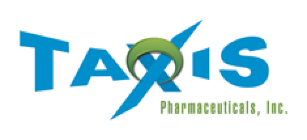TAXIS Pharmaceuticals, Inc. is a clinical stage company using its TAXISTENCE platform to develop anti-resistance drug candidates to enable the re-use of some of the most widely prescribed generic antibiotics against antibiotic-resistant bacteria, including the so-called ESKAPE pathogens—Enterococcus faecium, Staphylococcus aureus, Klebsiella pneumoniae, Acinetobacter baumannii, Pseudomonas aeruginosa and Enterobacter spp. Antimicrobial resistance is considered one of the biggest global health threats facing humanity in the twenty-first century, jeopardizing the progress made over a century of medical innovation. For example, recent data suggest that up to one in seven patients hospitalized with COVID-19 develops a dangerous secondary bacterial infection, with 50% of those patients ultimately dying of bacterial infections.
TAXIS’ strategy consists of addressing elemental forms of drug resistance by disrupting the bacterial cell wall architecture, including construction, maintenance and growth. The company’s pipeline includes investigational, preclinical and clinical stage anti-resistance agents based on novel mechanisms of action that include efflux pump inhibition and modulation of the bacterial cell division process of cytokinesis.
“Our focus is on resuscitating the activity of generic antibiotics to facilitate access to inexpensive, life-saving medications in community settings across the globe,” said Gregory G. Mario, President and CEO of TAXIS. “TAXIS’ approach enables the use of reduced antibiotic doses without compromising pathogen kill rates and thus could help reduce or altogether eliminate the global risk of antibiotic resistance.”
Generic antibiotics to work in MRSA
TAXIS’ lead asset is TXA709, an oral anti-MRSA (methicillin-resistant S. aureus) agent that recently completed a first-in-human phase 1 clinical trial with no serious adverse events. TXA709 targets the filamenting temperature-sensitive mutant Z (FtsZ) bacterial cell division protein, blocking post-mitotic septum formation. TXA709 is being developed for synergistic use in combination with antibiotics rendered obsolete by bacterial resistance. A phase 1 combination study of low-dose TXA709 with the generic cephalosporin antibiotic cefdinir is scheduled to begin later in 2020. The study will provide key absorption, distribution, metabolism and excretion (ADME) as well as PK and toxicity data. The only oral MRSA therapy currently available is linezolid, but resistant strains have already emerged.
The US Food and Drug Administration (FDA) has designated TXA709 a Qualified Infectious Disease Product (QIDP) under the Generating Antibiotics Incentives Now (GAIN) Act of 2012. The QIDP status grants eligibility for fast-track designation, priority review and 5 additional years of marketing exclusivity to encourage the development of new antimicrobial drugs to combat the rising threat of multidrug-resistant (MDR) bacteria.
TAXIS is evaluating the possibility of targeting FtsZ not only in Gram-positive bacteria but also in Gram-negative bacteria.
Targeting Gram-negative bacteria
MDR Gram-negative bacteria have been on the rise over the past decade, but few effective strategies to combat them have emerged.
TAXIS has developed a novel strategy consisting of targeting bacterial efflux pumps, a family of multi-protein complexes that span the bacterial cell membranes and act like bilge pumps that flush antibiotics out of the cell (Fig. 1). Indole carboxamide efflux pump inhibitors (EPIs) represent a new drug class designed to restore the efficacy of existing antibiotics against MDR Gram-negative bacteria. TAXIS’ EPIs have been shown to restore the activity, potency and effectiveness of multiple classes of antibiotics including macrolides, cephalosporins, monobactams, antimycobacterials, tetracyclines, fluoroquinolones and sulfonamides. To date, this synergistic effect has been demonstrated in vitro with 28 approved and marketed antibiotics that no longer work in the clinical setting or require high doses to have any effect.

Fig. 1 | First-in-class anti-resistance drugs to help treat patients with multidrug-resistant infections. TAXIS has developed a strategy consisting of targeting bacterial efflux pumps, a family of multi-protein complexes that span the bacterial cell membranes and act like bilge pumps that flush antibiotics out of the cell.
“We believe that advancement of our new anti-resistance drug candidates to combat MDR infections could result in a significant reduction in patient mortality with a substantial cost-effective societal benefit,” said Mario.
Anti-resistance drug development
TAXIS’ EPI program received a major boost earlier this year with a CARB-X award of $3.2 million, with potential for an additional $11.4 million, to support the company’s project on extended-spectrum β-lactamase (ESBL)-producing P. aeruginosa. The company also partners with academic institutions to enable discovery and development at university-sponsored laboratories. Ongoing partnerships include Rutgers University, the Robert Wood Johnson Medical School, the ILSE at Kean College, University of Houston, and Princeton University.
According to Mario, “TAXIS has developed a unique portfolio of proprietary anti-resistance drug candidates designed to facilitate treatment of patients affected by antibiotic-resistant strains of bacteria. We offer a unique opportunity to potential partners interested in developing solutions to mitigate the rise in antibiotic resistance globally with safe and cost-effective solutions for patients.”
The company is actively looking to partner its lead assets with pharma and to in-license novel anti-resistance drug candidates for development.


